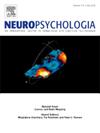The neurophysiological mechanisms of emotional conflict are influenced by social associations information of varying valence
IF 2
3区 心理学
Q3 BEHAVIORAL SCIENCES
引用次数: 0
Abstract
Previous research has indicated that emotional valence can influence the resolution of emotional conflicts, with this effect benefiting from the prioritized processing of negative emotions. In this study, a social learning paradigm was utilized to train participants to associate different neutral faces with distinct social meanings (e.g., stingy, generous). These learned neutral faces were then combined with emotion words of varying valence to create a novel face-word Stroop task. This task was employed to investigate whether social affective associations of different valences continue to impact emotional conflict processing. Concurrently, electroencephalogram data was recorded while participants completed the task. Behavioral results revealed that when participants were presented with neutral faces associated with negative social associations, emotional conflict resolution is facilitated, whereas when faced with neutral faces linked to positive social associations, the emotional conflict effect was significantly present. Consistency between event-related potentials and microstate results indicated that negative social associations facilitated conflict resolution, while positive social associations required participants to recruit more cognitive resources to inhibit irrelevant emotional interference. These findings further expand the factors influencing emotional conflict and relevant neurophysiological explanations.
情绪冲突的神经生理机制受到不同效价的社会关联信息的影响
先前的研究表明,情绪效价可以影响情绪冲突的解决,这种影响得益于对负面情绪的优先处理。本研究采用社会学习范式训练被试将不同的中性面孔与不同的社会意义(如吝啬、慷慨)联系起来。然后将这些习得的中性面孔与不同效价的情感词汇结合起来,创造出一项新的脸-词Stroop任务。本实验旨在探讨不同效价的社会情感关联是否持续影响情绪冲突加工。同时,在参与者完成任务时记录脑电图数据。行为结果表明,当被试面对与消极社会联想相关的中性面孔时,情绪冲突的解决得到了促进,而面对与积极社会联想相关的中性面孔时,情绪冲突的解决效果显著。事件相关电位与微观状态结果的一致性表明,消极的社会关联促进了冲突的解决,而积极的社会关联需要参与者招募更多的认知资源来抑制不相关的情绪干扰。这些发现进一步拓展了影响情绪冲突的因素和相关的神经生理学解释。
本文章由计算机程序翻译,如有差异,请以英文原文为准。
求助全文
约1分钟内获得全文
求助全文
来源期刊

Neuropsychologia
医学-行为科学
CiteScore
5.10
自引率
3.80%
发文量
228
审稿时长
4 months
期刊介绍:
Neuropsychologia is an international interdisciplinary journal devoted to experimental and theoretical contributions that advance understanding of human cognition and behavior from a neuroscience perspective. The journal will consider for publication studies that link brain function with cognitive processes, including attention and awareness, action and motor control, executive functions and cognitive control, memory, language, and emotion and social cognition.
 求助内容:
求助内容: 应助结果提醒方式:
应助结果提醒方式:


